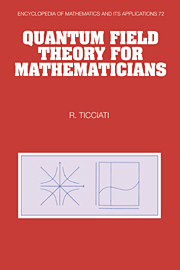Book contents
- Frontmatter
- Contents
- Preface
- Introduction
- 1 Relativistic Quantum Mechanics
- 2 Fock Space, the Scalar Field, and Canonical Quantization
- 3 Symmetries and Conservation Laws
- 4 From Dyson's Formula to Feynman Rules
- 5 Differential Transition Probabilities and Predictions
- 6 Representations of the Lorentz Group
- 7 Two-Component Spinor Fields
- 8 Four-Component Spinor Fields
- 9 Vector Fields and Gauge Invariance
- 10 Reformulating Scattering Theory
- 11 Functional Integral Quantization
- 12 Quantization of Gauge Theories
- 13 Anomalies and Vacua in Gauge Theories
- 14 SU(3) Representation Theory
- 15 The Structure of the Standard Model
- 16 Hadrons, Flavor Symmetry, and Nucleon-Pion Interactions
- 17 Tree-Level Applications of the Standard Model
- 18 Regularization and Renormalization
- 19 Renormalization of QED: Three Primitive Divergences
- 20 Renormalization and Preservation of Symmetries
- 21 The Renormalization Group Equations
- Appendix
- References
- Index
8 - Four-Component Spinor Fields
Published online by Cambridge University Press: 31 October 2009
- Frontmatter
- Contents
- Preface
- Introduction
- 1 Relativistic Quantum Mechanics
- 2 Fock Space, the Scalar Field, and Canonical Quantization
- 3 Symmetries and Conservation Laws
- 4 From Dyson's Formula to Feynman Rules
- 5 Differential Transition Probabilities and Predictions
- 6 Representations of the Lorentz Group
- 7 Two-Component Spinor Fields
- 8 Four-Component Spinor Fields
- 9 Vector Fields and Gauge Invariance
- 10 Reformulating Scattering Theory
- 11 Functional Integral Quantization
- 12 Quantization of Gauge Theories
- 13 Anomalies and Vacua in Gauge Theories
- 14 SU(3) Representation Theory
- 15 The Structure of the Standard Model
- 16 Hadrons, Flavor Symmetry, and Nucleon-Pion Interactions
- 17 Tree-Level Applications of the Standard Model
- 18 Regularization and Renormalization
- 19 Renormalization of QED: Three Primitive Divergences
- 20 Renormalization and Preservation of Symmetries
- 21 The Renormalization Group Equations
- Appendix
- References
- Index
Summary
Applying perturbative canonical quantization to four-component spinor fields: developing the quantum theory of the free field on the basis of classical polarization spinors and Dirac algebra to obtain the Feynman diagrams and rules for the interacting field.
Introduction
This chapter presents the standard quantum theory of Dirac fields. It implements canonical quantization perturbatively, following the principles laid out in Chapter 4 but in the style appropriate to fermions, as developed in Chapter 7. The advantages of the Dirac four-component notation even for Weyl-type fields like the neutrino originate in the many convenient features of the algebra of Dirac matrices. This chapter covers these features in detail, providing all the knowledge necessary for computing with fermions.
Sections 8.1 and 8.2 introduce Dirac algebra, its common representations and their basic properties, thereby providing a firm foundation for computation with four-component spinors. Section 8.3 uses the plane-wave solutions of the Dirac equation to set up classical polarization spinors for each on-shell momentum. In Section 8.4, on the basis of the Weyl spinor theory, we simply write down the equal-time anti-commutation relations for the Dirac field and give a free-field solution in terms of creation and annihilation operators. Again using our experience with Weyl fields, Section 8.5 quickly deduces Feynman rules from Dyson's formula and the Wick contraction of free Dirac fields.
- Type
- Chapter
- Information
- Quantum Field Theory for Mathematicians , pp. 207 - 245Publisher: Cambridge University PressPrint publication year: 1999

